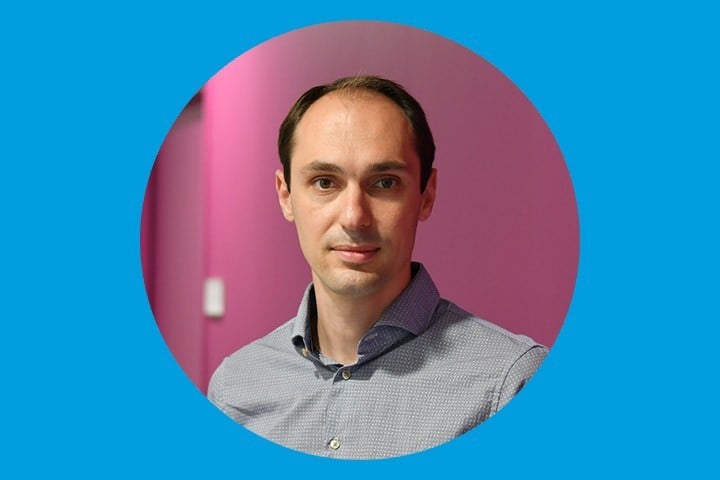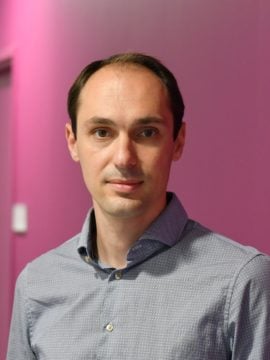
Interview of Fabien Wagner, new team leader at IMN
 IMN is welcoming Fabien Wagner on Wednesday, April 1st, who will lead the team “Neuromodulation and neuroprosthetics”.
IMN is welcoming Fabien Wagner on Wednesday, April 1st, who will lead the team “Neuromodulation and neuroprosthetics”.
He was awarded the Junior Team Leader chair of the Neurocampus program funded by the Région Nouvelle-Aquitaine.
Bordeaux Neurocampus: Fabien Wagner, welcome to Bordeaux Neurocampus! Could you please tell us about your profile and career?
Fabien Wagner: I was trained first as an engineer and then as a neuroscientist, and I conduct research at the intersection between Neuroscience and Neuroengineering. I am interested in understanding how the dynamics of neuronal networks become altered in neurological disorders or after an injury, and how to restore their natural behaviour using neuromodulation approaches. During my Ph.D. at Brown University, I developed new tools to record and stimulate the brain simultaneously and investigated the cortical dynamics that underlie the transition to epileptic seizures in rodent models and epileptic patients. During my postdoctoral work at the Ecole Polytechnique Fédérale de Lausanne (EPFL), I first pioneered neuroprosthetic technologies to restore locomotion in non-human primates. I then led a large team of scientists, engineers and clinicians to translate these technologies into patients with spinal cord injury, as part of a first-in-human clinical study. Our preliminary results, published in 2018, show that electrical stimulation of the spinal cord can restore walking in humans even after several years of paralysis.
BN. What will your team work on?
FW. My main goal is to develop new neuromodulation paradigms and neuroprosthetic systems for repairing or replacing circuit-level functions that get disrupted after neurological disorders or injury. As a team leader within the Institute of Neurodegenerative Diseases, I am mainly interested in expanding the use of neuroprosthetic systems beyond their current applications in motor disorders, towards neurocognitive disorders such as memory impairments and dementia. The specific goal of this Neurocampus project is to develop a large-scale brain network neuroprosthesis to restore memory after brain injury or neurodegenerative diseases such as Alzheimer’s disease.
BN: Which technics and methods wil you use ?
FW: Our research combines techniques from Neuroscience and Neuroengineering, in particular in vivo electrophysiology, signal processing, machine learning and control engineering. Our approach uses intracranial multielectrode recordings of neuronal activity at various spatial scales such as local field potentials and electrocorticographic activity, combined with spatially, temporally and spectrally patterned multisite neurostimulation. The principle of this targeted stimulation is to emulate the healthy neuronal dynamics. It aims at restoring the communication between remote brain areas which become functionally disconnected in memory disorders as a result of injury or neurodegeneration. By combining this neuromodulation approach with cognitive training protocols, we further aim at promoting neuroplasticity mechanisms and long-term improvements in cognitive functions.
BN: What were your main reasons for applying for this position in Bordeaux?
FW: After my main postdoctoral work got published in 2018, it was the right time for me to apply for faculty positions and to start my own independent research team. To obtain such positions, mobility is usually required. The idea is to bring your skillset to a new environment to enable novel and synergistic interactions. As my goal is to develop neurotechnologies from preclinical models to patients, I wanted to join an institution that would enable such a translational work. This includes access to animal facilities, proximity of a clinical platform, and the presence of research teams that would complement my own expertise. The Bordeaux Neurocampus brings together all these different components, which was my main incentive to apply. The Neurocampus young investigator chair also provides budget for equipment and personnel for 3 years, which is key to creating a new research group. It gives the resources and time to establish an independent line of work, before applying for CNRS and European grants to move the research forward.
BN: Will there be positions soon ?
FW: Absolutely! Due to the current COVID-19 situation, we cannot start recruitment immediately but we accept applications from motivated students and postdoctoral researchers with expertise in the fields of neuroscience, biomedical engineering or any other relevant discipline.
BN: Thank you Fabien! And welcome again!
More details
Link to his page and publications
Last update 24/07/20
